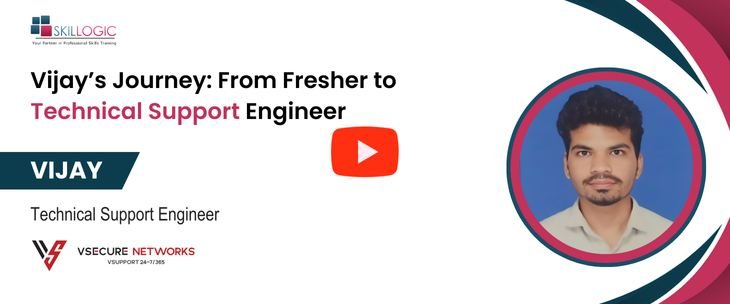Vijay’s Journey: From Fresher to Technical Support Engineer
Vijay’s journey from fresher to Technical Support Engineer in Bengaluru through cyber security training and hands-on projects.

With cyber threats rising across industries, the demand for skilled cyber security professionals is growing rapidly. Many individuals, even from non-technical backgrounds, are choosing to explore this field to build a secure and rewarding career. Vijay’s story is one such example of how curiosity, determination, and structured learning at SKILLOGIC Institute can help overcome challenges and open new opportunities.
Vijay began his professional journey as a Design Engineer after completing his mechanical engineering degree. However, his curiosity about networks, cyber attacks, and online security led him to pursue a career in cyber security. He enrolled in a comprehensive course at SKILLOGIC Institute in Chennai, where hands-on training, live projects, and guidance from expert mentors equipped him with the necessary skills. Through consistent practice, patience, and dedication, Vijay successfully transitioned into the role of a Technical Support Engineer at VSecure Networks in Bengaluru. His journey serves as an inspiring example for anyone aiming to enter the cyber security domain, showing that determination and continuous learning can make career transitions possible.
Let’s explore how Vijay transformed his career path and built a strong foundation in cyber security with the right guidance.
Vijay’s Transition to Cyber Security with SKILLOGIC
In this exclusive session, we interact with Vijay, a SKILLOGIC learner who successfully transitioned from a mechanical engineering background into the cyber security field. He shares his honest learning experience, challenges, and the support he received from SKILLOGIC before securing his very first job in cyber security.
Q1: Can you tell us about your background and how you got interested in cyber security?
My name is Vijay, and I completed my mechanical engineering at SRM University, Ramapuram. I initially started my career as a design engineer but became very curious about how networks work and how hackers manage to crack systems. This curiosity slowly pushed me to explore cyber security. I wanted to understand how data travels from one computer to another, how communication happens, and how attackers exploit weaknesses. With time, my curiosity grew stronger, and SKILLOGIC gave me the platform to learn and ask questions, which helped me move toward cyber security seriously.
Q2: How did you begin your learning journey at SKILLOGIC?
I enrolled in a three-month cyber security course at SKILLOGIC’s Chennai center. The classes were offline, and the schedule included weekend sessions for about six hours. Each class started with fundamentals like networking, topologies, and port numbers, then moved into cyber security tools such as Nmap. Mentors gave live demos, and after that, we were asked to try running the tools ourselves. Whenever I faced difficulties, I could ask questions directly, which made learning easier. The combination of theory and practical exposure made the concepts much more understandable.
Q3: Since you came from a mechanical background, how was the transition into cyber security?
At the beginning, it was tough because everything was new to me. Even basic terms like port numbers and IP addresses were unfamiliar. After every class, I would spend extra time at home researching terms on YouTube and making notes. Slowly, I built confidence by revisiting concepts, practicing, and asking mentors questions during the next class. While the transition was not easy, step by step I adapted, and now I realize cyber security is a vast field where continuous learning is important.
Q4: How supportive were the trainers and mentors at SKILLOGIC during your course?
The trainers were very supportive. Many times, my doubts were the same as other students, and during interactive sessions, we learned from each other’s questions. Even though I came from a non-IT background, the mentors explained concepts in a way that was easy to understand. If I ever got stuck, I could ask my doubts directly in class or even clarify them later. This support gave me confidence to move forward without feeling left behind.
Q5: How was your internship and project experience at SKILLOGIC?
Initially, I found my first project difficult and had to seek help from classmates. With guidance from my friends and mentors, I started from scratch and slowly learned to handle projects on my own. Each project, whether it was network scanning or firewall testing, gave me new challenges and valuable experience. I wrote down both the problems I faced and the solutions I found, which helped me in future projects. The continuous support from trainers and the interactive environment with peers made the internship experience very valuable.
Q6: How did the placement team at SKILLOGIC help you secure your job?
The placement team was very proactive. They took the initiative to call me, guide me, and even send updates through email and WhatsApp to make sure I didn’t miss any opportunities. They were consistent in motivating me and keeping me on track, which gave me confidence during the job search process.
Q7: What was your interview experience like?
I attended two interviews with the same company. The first round was for a different role where I struggled with technical questions, but in the second round, they tested my fundamentals. They asked me about the OSI layers, networking topologies, and port numbers. They even gave a real-time problem, asking what I would do if my laptop suddenly froze. I answered that I would check the task manager for any unwanted processes or memory issues. This practical approach seemed to impress them, and I was selected for the role.
Q8: What advice would you give to newcomers in cyber security, especially those from non-IT backgrounds?
My advice is to first build strong basics in networking, port numbers, and system fundamentals. Once the basics are clear, try to connect them to real-life applications. It is also important to ask questions without hesitation because curiosity is what drives learning in this field. Self-learning is necessary, but at the same time, make the most of mentor support. Keep practicing, take notes, and always relate what you learn in class to practical situations. Cyber security is a growing domain, and with patience and consistent effort, anyone even from a non-technical background can build a career in it.
Refer these articles:
- Selvi’s Journey: From Healthcare Professional to SOC Analyst
- Mahendra’s Journey: From Email Support to SOC Analyst
- Chandrakant’s Journey: From Learner to Cyber Security Analyst
Key Findings from Vijay’s Cyber Security Journey
Vijay’s journey demonstrates how learners from non-IT backgrounds can successfully transition into cyber security with proper guidance, hands-on experience, and mentorship. His experience with SKILLOGIC highlights key aspects that made this possible:
- Smooth transition from a non-IT background – SKILLOGIC’s beginner-friendly approach helped Vijay understand networking, port numbers, and basic cyber security concepts before moving to advanced topics.
- Balanced learning approach – The training combined theory with hands-on practice using tools like Nmap, making it easier to understand and apply concepts in real scenarios.
- Offline classroom advantage – Attending classes in Chennai allowed Vijay to interact directly with mentors, ask doubts instantly, and gain practical exposure through live demonstrations.
- Strong mentorship and peer learning – Mentors simplified complex topics, while collaborative discussions with classmates enhanced understanding and provided multiple perspectives on challenges.
- Project-based training for confidence building – Internship projects like network scanning and firewall testing allowed Vijay to apply his learning, solve real problems, and gradually build confidence in cyber security tasks.
- Active placement support – The SKILLOGIC placement team guided Vijay throughout the process, providing timely follow-ups and support via email and WhatsApp to help him secure interviews.
- Interview readiness through fundamentals – By focusing on basics such as OSI layers and network topologies, SKILLOGIC prepared Vijay to confidently answer technical questions and tackle real-time problem-solving in interviews.
- Career breakthrough in first job – With structured training, hands-on projects, and mentorship, Vijay successfully secured his first cyber security role, showing that consistent effort and guided learning pay off.
In short, Vijay’s journey shows that curiosity, consistent effort, and the right guidance can help anyone transition into cyber security. By building strong fundamentals, practicing through hands-on projects, and seeking mentor support, he successfully moved from a mechanical background to a Technical Support Engineer at VSecure Networks in Bengaluru. His story proves that dedication and continuous learning are key to succeeding in this growing field.
Vijay’s journey from a fresher to a Technical Support Engineer reflects the booming opportunities in India’s cybersecurity sector. According to Nucamp, India’s cybersecurity market is projected to reach ₹280 billion by 2025, growing at an annual rate of 18.33%. Entry-level salaries for roles like cybersecurity analysts start at ₹6.9 LPA, highlighting strong earning potential. The surge in demand is driven by rising cyber threats and digital transformation, making it an ideal time for individuals from diverse backgrounds to enter this field and build a successful career.
Refer these articles:
- How to Become a Cyber Security Expert in Coimbatore
- Cyber Security vs Ethical Hacking in Ahmedabad
- The Rise Of Cyber Security Careers In Ahmedabad
SKILLOGIC offers a comprehensive Cyber Security Certification course designed to equip learners with industry-ready skills. Our Cyber Security Professional Plus program includes an Ethical Hacking Course, SOC Certification Course, network security, threat analysis, and vulnerability management. Spanning 4 months with over 200 learning hours, the program provides 24/7 cloud lab access, practical labs, real-time projects, and coverage of essential cyber security domains. Learners are also prepared for globally recognized certifications such as NASSCOM FutureSkills and IIFIS. With flexible class timings, this is one of the most sought-after cyber security courses in Coimbatore, ideal for both students and working professionals.
The program covers modules like penetration testing, IDS/IPS management, SIEM tools, malware analysis, and compliance standards. The Ethical Hacking Course focuses on offensive security skills, while the SOC Certification Course trains learners to monitor and respond to cyber threats effectively. Both courses ensure a strong understanding of cyber security operations from multiple perspectives.
SKILLOGIC has major branches including Bangalore, Pune, Hyderabad, Jaipur, Noida, Kochi, and Ahmedabad, making it highly accessible across India. Our cyber security institute in Ahmedabad is popular among IT professionals and beginners seeking advanced expertise. Experienced trainers provide guidance in both theoretical concepts and practical implementation.
Completing SKILLOGIC’s program prepares learners for certifications like NASSCOM FutureSkills and IIFIS and opens opportunities for roles such as SOC Analyst, Penetration Tester, Security Consultant, or Cybersecurity Engineer. With hands-on practice, career support, and placement assistance, the program builds a strong foundation for a successful cyber security career.


0
91